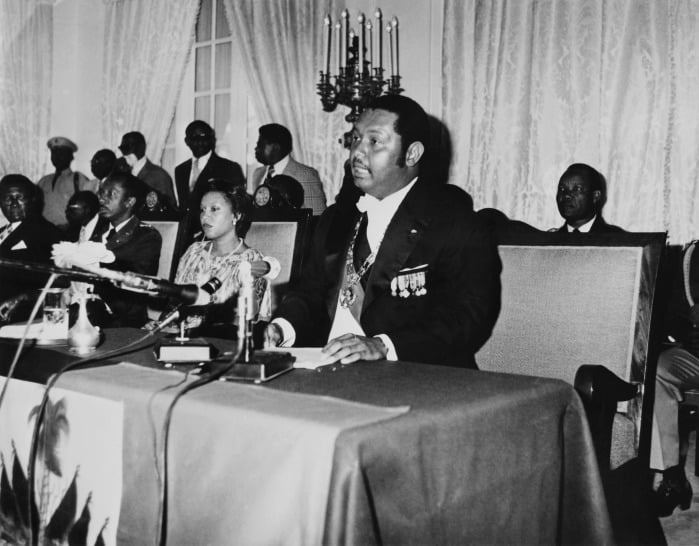PORT-AU-PRINCE — Haiti’s former dictator Jean-Claude “Baby Doc” Duvalier, who ruled the impoverished Caribbean nation from 1971 until his ouster in 1986, died Saturday of a heart attack, officials here said. He was 63.
The death of Baby Doc, who returned to Haiti in 2011 after 25 years of exile, was announced by the nation’s health minister, Florence Guillaume Duperval.
On Twitter, President Michel Martelly expressed his “sincere condolences to the family and to the nation” for the loss of “an authentic son of Haiti.”
“Love and reconciliation must always prevail over our internal quarrels. May he rest in peace,” wrote Martelly, who said he was paying tribute to the former president “despite our quarrels and our differences.”
L’amour et la réconciliation doivent toujours vaincre nos querelles intestines. Que ton âme repose en paix #JeanClaudeDuvalier
— Michel J. Martelly (@MichelJMartelly) October 4, 2014
Duperval said Duvalier died of an apparent heart attack.
“The family phoned us this morning asking us to send a [medical] helicopter,” she told AFP.
“They tried to administer first aid to him on the scene, but he died” a short time later, she said.
The New York Times summed up Duvalier’s terrifying rule after the teenager replaced his tyrannical father:
Mr. Duvalier continued to defend what human rights workers called one of the most oppressive governments in the Western Hemisphere, following in the footsteps of his father, François, known as Papa Doc, who also died suddenly, in 1971. The son was 19 when he assumed the post “president for life,” as he and his father called it, becoming the youngest head of state at the time.
He never apologized for atrocities, including brutal crackdowns on opponents at the hands of the feared Tonton Macoutes, a civilian militia that left a thousand people, if not more, dead, disappeared or illegally detained in harsh prisons.
For a decade-and-a-half, the portly, boyish-looking Duvalier ruled as Haiti’s self-proclaimed “president for life” until he was forced into exile in a popular uprising, as pro-democracy forces rallied in the streets amid international condemnation of the rampant human rights abuses during his regime.
Like his father, Baby Doc came to rule Haiti with an iron fist — barring opposition, clamping down on dissidents, rubber-stamping his own laws and pocketing government revenue.
And like his ruthless father, he also made liberal use of the dreaded Tonton Macoutes, a secret police force loyal to the Duvalier family. The notorious sunglass-toting Macoutes terrorized Haitians, arresting, torturing untold numbers of political opponents, thousands of whom vanished without ever being accounted for.

Raised amid intrigue and paranoia
Born in Port-au-Prince on July 3, 1951, the young Duvalier watched the intrigue and paranoia escalate in his father’s 14-year government, which began in 1957 and saw waves of arrests, executions, bombings and 11 failed coups.
At the age of 11 he survived an attack that killed three of his bodyguards.
An estimated 30,000 people were killed during the reign of the Duvalier father and son, rights activists said.
The younger Duvalier fled Haiti in 1986 for a life of luxury in France, thanks to the hundreds of millions of dollars allegedly plundered from the coffers of the Western Hemisphere’s most impoverished country.
Years of efforts to force his family to return the pilfered funds proved fruitless.
In the late 1990s former political prisoners brought charges of “crimes against humanity” against Baby Doc in a Paris court, claiming they were tortured over a period of years, but the lawsuit later foundered.
In 2007, Duvalier called on Haitians to forgive him for “mistakes” committed during his rule, even as the government in power at the time insisted he face trial.
At the time of his death, he was indeed charged in a slow-moving prosecution on corruption and embezzlement allegations dating to his years in power. He was said in reports to have looted as much as $300 million before being forced to flee.
Much of the money, however, was reported to have been frittered away on a lavish lifestyle filled with fancy homes, jewelry and cars.
He returned home January 16, 2011, in what he said was a gesture of solidarity with a nation that had been devastated the year before by a massive earthquake, which leveled much of Port-au-Prince and claimed more than 100,000 lives.
The day after his unexpected return, Haitian police arrested Duvalier on charges of embezzlement. In February 2013, he pleaded not guilty to charges of corruption and human rights abuse.
But efforts to bring him to justice became tangled in legal motions and appeals, and proved unsuccessful in the end.
Other than his brief jailing shortly after his arrival, Duvalier remained at liberty for the rest of his life.
Reed Brody, of Human Rights Watch and who helped victims build their criminal case against Duvalier, lamented that the former dictator never paid for his crimes.
“It’s a shame that the Haitian justice system could not bring Baby Doc Duvalier to trial before he died,” he said in a statement.
“Duvalier’s rule was marked by systematic human rights violations. Hundreds of political prisoners held in a network of prisons died from mistreatment or were victims of extrajudicial killings,” Brody said.
“Duvalier’s government repeatedly closed independent newspapers and radio stations. Journalists were beaten, in some cases tortured, jailed, and forced to leave the country.”
Added Brody: “Duvalier’s death deprives Haitians of what could have been the most important human rights trial in the country’s history.”






